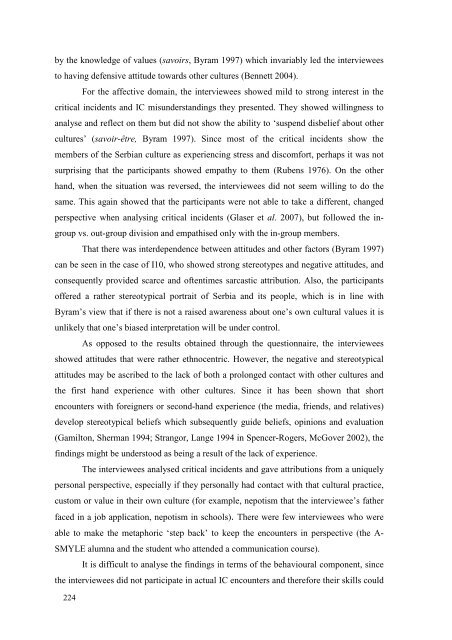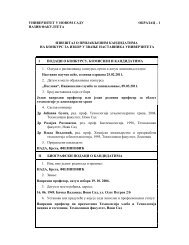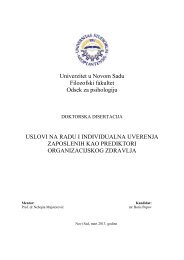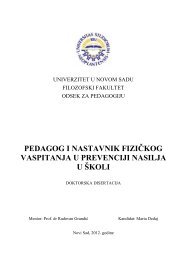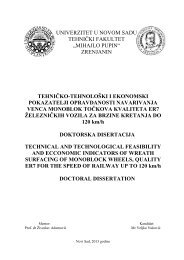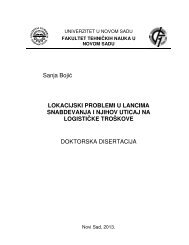Intercultural competence as an aspect of the communicative ...
Intercultural competence as an aspect of the communicative ...
Intercultural competence as an aspect of the communicative ...
Create successful ePaper yourself
Turn your PDF publications into a flip-book with our unique Google optimized e-Paper software.
y <strong>the</strong> knowledge <strong>of</strong> values (savoirs, Byram 1997) which invariably led <strong>the</strong> interviewees<br />
to having defensive attitude towards o<strong>the</strong>r cultures (Bennett 2004).<br />
For <strong>the</strong> affective domain, <strong>the</strong> interviewees showed mild to strong interest in <strong>the</strong><br />
critical incidents <strong>an</strong>d IC misunderst<strong>an</strong>dings <strong>the</strong>y presented. They showed willingness to<br />
<strong>an</strong>alyse <strong>an</strong>d reflect on <strong>the</strong>m but did not show <strong>the</strong> ability to ‘suspend disbelief about o<strong>the</strong>r<br />
cultures’ (savoir-être, Byram 1997). Since most <strong>of</strong> <strong>the</strong> critical incidents show <strong>the</strong><br />
members <strong>of</strong> <strong>the</strong> Serbi<strong>an</strong> culture <strong>as</strong> experiencing stress <strong>an</strong>d discomfort, perhaps it w<strong>as</strong> not<br />
surprising that <strong>the</strong> particip<strong>an</strong>ts showed empathy to <strong>the</strong>m (Rubens 1976). On <strong>the</strong> o<strong>the</strong>r<br />
h<strong>an</strong>d, when <strong>the</strong> situation w<strong>as</strong> reversed, <strong>the</strong> interviewees did not seem willing to do <strong>the</strong><br />
same. This again showed that <strong>the</strong> particip<strong>an</strong>ts were not able to take a different, ch<strong>an</strong>ged<br />
perspective when <strong>an</strong>alysing critical incidents (Gl<strong>as</strong>er et al. 2007), but followed <strong>the</strong> ingroup<br />
vs. out-group division <strong>an</strong>d empathised only with <strong>the</strong> in-group members.<br />
That <strong>the</strong>re w<strong>as</strong> interdependence between attitudes <strong>an</strong>d o<strong>the</strong>r factors (Byram 1997)<br />
c<strong>an</strong> be seen in <strong>the</strong> c<strong>as</strong>e <strong>of</strong> I10, who showed strong stereotypes <strong>an</strong>d negative attitudes, <strong>an</strong>d<br />
consequently provided scarce <strong>an</strong>d <strong>of</strong>tentimes sarc<strong>as</strong>tic attribution. Also, <strong>the</strong> particip<strong>an</strong>ts<br />
<strong>of</strong>fered a ra<strong>the</strong>r stereotypical portrait <strong>of</strong> Serbia <strong>an</strong>d its people, which is in line with<br />
Byram’s view that if <strong>the</strong>re is not a raised awareness about one’s own cultural values it is<br />
unlikely that one’s bi<strong>as</strong>ed interpretation will be under control.<br />
As opposed to <strong>the</strong> results obtained through <strong>the</strong> questionnaire, <strong>the</strong> interviewees<br />
showed attitudes that were ra<strong>the</strong>r ethnocentric. However, <strong>the</strong> negative <strong>an</strong>d stereotypical<br />
attitudes may be <strong>as</strong>cribed to <strong>the</strong> lack <strong>of</strong> both a prolonged contact with o<strong>the</strong>r cultures <strong>an</strong>d<br />
<strong>the</strong> first h<strong>an</strong>d experience with o<strong>the</strong>r cultures. Since it h<strong>as</strong> been shown that short<br />
encounters with foreigners or second-h<strong>an</strong>d experience (<strong>the</strong> media, friends, <strong>an</strong>d relatives)<br />
develop stereotypical beliefs which subsequently guide beliefs, opinions <strong>an</strong>d evaluation<br />
(Gamilton, Sherm<strong>an</strong> 1994; Str<strong>an</strong>gor, L<strong>an</strong>ge 1994 in Spencer-Rogers, McGover 2002), <strong>the</strong><br />
findings might be understood <strong>as</strong> being a result <strong>of</strong> <strong>the</strong> lack <strong>of</strong> experience.<br />
The interviewees <strong>an</strong>alysed critical incidents <strong>an</strong>d gave attributions from a uniquely<br />
personal perspective, especially if <strong>the</strong>y personally had contact with that cultural practice,<br />
custom or value in <strong>the</strong>ir own culture (for example, nepotism that <strong>the</strong> interviewee’s fa<strong>the</strong>r<br />
faced in a job application, nepotism in schools). There were few interviewees who were<br />
able to make <strong>the</strong> metaphoric ‘step back’ to keep <strong>the</strong> encounters in perspective (<strong>the</strong> A-<br />
SMYLE alumna <strong>an</strong>d <strong>the</strong> student who attended a communication course).<br />
It is difficult to <strong>an</strong>alyse <strong>the</strong> findings in terms <strong>of</strong> <strong>the</strong> behavioural component, since<br />
<strong>the</strong> interviewees did not participate in actual IC encounters <strong>an</strong>d <strong>the</strong>refore <strong>the</strong>ir skills could<br />
224


